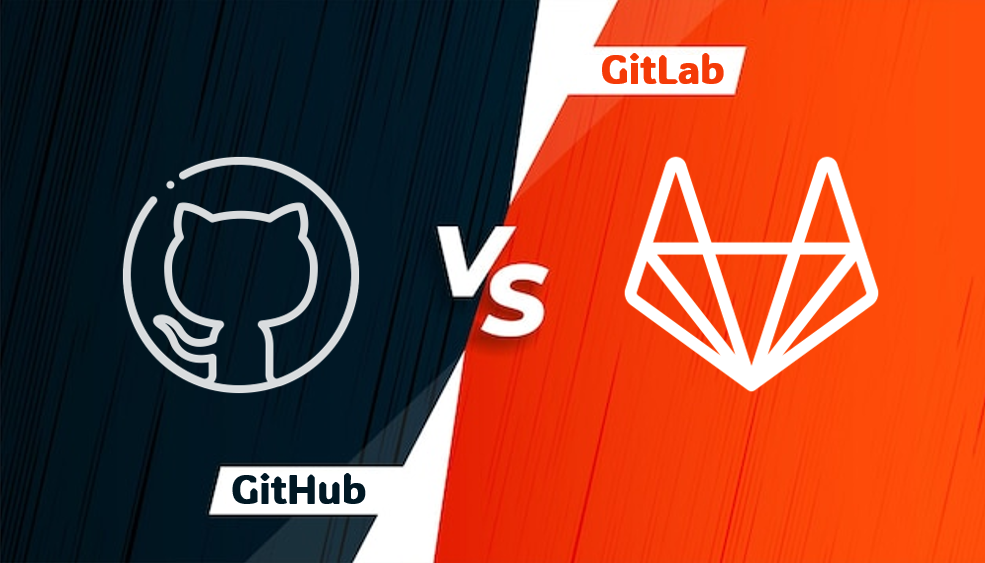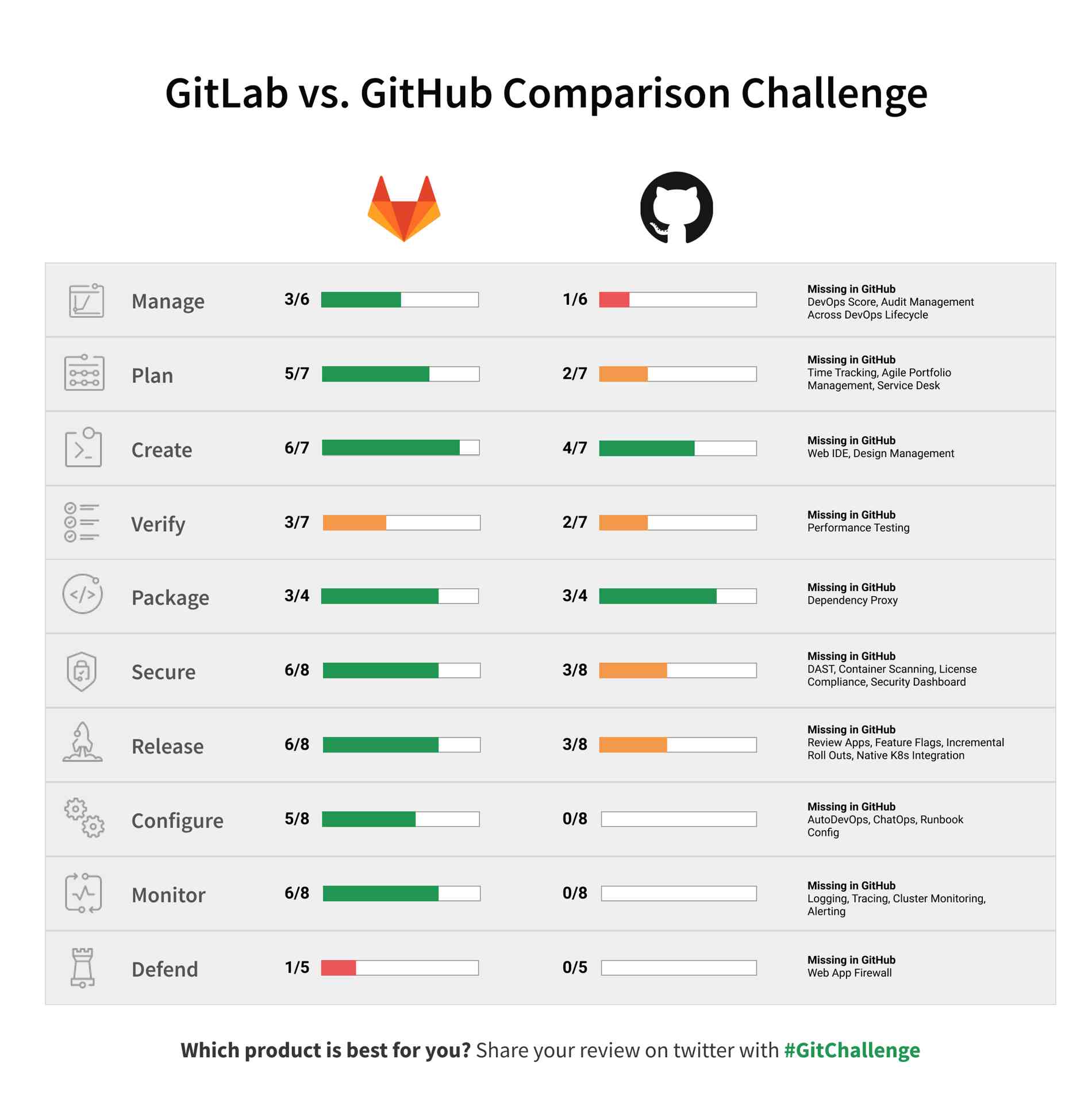The tech field places a lot of emphasis on version control systems. They are vital for tracking code tweaks, team collaborations, and project workflows. Two main players in this arena are GitHub and GitLab.
These platforms have their unique traits, but offer similar services. As we peer into the future of tech, it’s important to mull over which will stand tall.
This post deliberates the merits and drawbacks of both GitLab and GitHub, aiming to forecast which will prevail. So, let’s plunge into the version control universe and scrutinize the GitHub versus GitLab feud.

GitHub vs GitLab: A Brief Guide
GitHub and GitLab hold prominent places within the DevOps world, transforming how we program. Funded by Microsoft, GitHub has blossomed into a programmer’s sanctuary, boasting over 50 million users.
It shines in its capacity to store and access code, oversee projects, and simplify the software creation process. This platform has become a pillar in the programming sphere, boasting a lively and passionate community.
In contrast, GitLab is not just a platform – it’s an all-in-one DevOps tool. It aims to streamline the coding lifecycle, combining elements such as project planning, source code regulation, and constant integration and delivery into a single entity.
GitLab, an open-source platform, has its strength in customization, making it appealing for users after self-hosting capabilities. This separates it from others, winning it a sizable user faction.
GitHub and GitLab are multifaceted platforms each with its own attractions. GitHub’s simplicity is perfect for beginners, centering on code storing and project management.
GitLab, on the other hand, is a bit trickier yet still easy to use. It suits those who need a full package for the software creative process. Choosing GitHub or GitLab depends on your specific demands.
GitLab vs GitHub: Key Differences

User Interface & Experience
User interface and the overall user experience play key roles in choosing between GitHub and GitLab. Both aim to offer a smooth, productive setting for software creation.
GitHub
The GitHub interface is simple. It’s built for newbies in software creation. GitHub hones in on the repository, a core feature. Tools like issue tracking and Pull Requests are at hand within this main structure. This lets users handle their projects without leaving the codebase. GitHub is ideal for those who cherish simplicity in their coding projects.
GitLab
On the flip side, GitLab has a slightly more complex yet still easy to use interface. Its extensive toolkit displays GitLab’s full-bodied approach to software creation. Users have access to tools for project planning, code management, continuous integration, and deployment within this all-in-one platform. This broad scope is appealing to experienced developers and firms requiring a one-stop solution for software creation.
Which is the Best?
Comparing user experiences, both platforms give easy use to users. However, GitHub’s simple layout helps newbies navigate, while GitLab’s detailed design suits users wanting a rich DevOps experience. The contrast between GitHub and GitLab’s interfaces highlights their different values. GitHub’s simplicity emphasizes the importance of its repository operations, while GitLab’s thorough design accommodates a full software development cycle.
Feature Comparison
Comparing features between GitHub and GitLab is important.
GitHub
GitHub provides many tools, free private repositories, built-in project management, collaborative code review, and an extensions marketplace. Its focus on repository management shines through its features, all designed for code hosting and project organization.
GitLab
On the other hand, GitLab pushes the boundaries with more features, exceeding traditional source code management. Similar to GitHub, GitLab has premium extras like built-in integration and deployment tools, high-tier project management features, and security testing tools ready to use. GitLab’s features focus not just on code, but on delivering a full DevOps solution covering the whole software development cycle.
GitHub simplifies managing and collaborating on code, making it great for users who want an easy environment for this. On the other hand, GitLab gives you more tools for the entire development lifecycle. This makes GitLab really useful for users who want everything for DevOps in one place.
Which is the Best?
To put it simply, GitHub is great at hosting code and managing projects, whereas GitLab offers loads of tools for a full DevOps experience. If you need streamlined operations, choose GitHub. Need a complete development lifecycle? Choose GitLab.
Community Support and Popularity
Community involvement and how well a platform is received is key to its success.
GitHub
As for user popularity, GitHub has more users. They have over 50 million developers. It’s been around longer and has been adopted by big tech companies such as Microsoft, Google, and Facebook. But GitHub’s strength goes beyond just user numbers. It comes from the active participation and contributions to a large number of open-source projects on the platform.
GitLab
GitLab, though newer, has made its mark in the developer community. It has about 30 million users and is growing. The platform’s open-source style has created a devoted community that continues to greatly expand and improve GitLab’s projects.
Which is the Best?
It’s worth noting that while numbers do carry weight, the value of a platform extends beyond mere statistics. Both GitHub and GitLab have cultivated dynamic, engaged communities that play a crucial role in their development. GitHub’s larger user base translates to a more diverse community, a vast array of projects, and an expansive network of collaborators. On the other hand, GitLab’s community is appreciated for its active participation in the open-source ecosystem, contributing to the platform’s continual evolution.
In terms of popularity, GitHub may appear to lead the pack. Still, GitLab’s rapid growth, vibrant open-source community, and commitment to evolving with the needs of its users make it a robust contender in the software development space.
Pricing Models Comparison
When it comes to determining the value proposition of GitHub and GitLab, it is essential to delve into the financial aspects. Both these DevOps platforms offer free versions of their services, however, to unlock their premium offerings, one has to subscribe to their respective paid plans.
GitHub
GitHub operates its pricing model on a per-collaborator basis. It means that the more collaborators you have on a private repository, the more you have to pay. GitHub’s paid plans are feature-rich, offering benefits like advanced auditing, SAML, personalized support, and more. These premium features can dramatically enhance the development and collaboration processes, but they do come at a cost.
GitLab
GitLab’s price setup uses a per-user approach. It’s pretty flexible, and many find it more cost-friendly. Plus, there’s lots of features included when you pay. Some GitLab extra features include multiple project pipeline graphs, permission settings for specific atmospheres, and advanced tools for testing security.
Which is the Best?
GitHub and GitLab both have strong feature sets with their paid plans. The difference? Pricing and what you get for it. GitHub is ideal for smaller teams or projects with few collaborators because of its per-collaborator charging. GitLab, with a per-user cost and lots more features, suits larger teams or businesses needing advanced DevOps tools better.
When choosing between GitHub and GitLab’s costs, consider team size, project size, and how many advanced features you need. Know your budget too. This will help you make a smart choice between these solid DevOps platforms.
Security Comparison
As data breaches and cyber attacks become common, GitHub and GitLab know security is key in software development. They take serious steps to keep your projects secure.
GitHub
GitHub shines by incorporating Dependabot. This automatic tool spots and signals users about probable security risks in their code. It checks dependencies for identified security problems and makes automatic update requests for those affected. This means developers can concentrate on their work, free from the continuous fear of potential security threats in their project dependencies.
GitLab
GitLab has beefed up its safety plans with Static Application Security Testing (SAST) and Dynamic Application Security Testing (DAST). SAST takes a hard look at an application’s source code to locate possible security risks. On the flip side, DAST works by fake hacking to spot security problems in a live web app. Used together, these functions deliver a thorough security check-up. They ensure not only protection from known vulnerabilities but readiness against simulated cyber threats too.
Which is the Best?
Furthermore, GitHub and GitLab both include fine-grained access controls. This allows project owners to pick who can touch specific parts of their projects. This safeguard guarantees that sensitive information and codes are only open to approved people, making project security even stronger.
Larger picture, both platforms follow strict sector-standard security rules and are dedicated to preserving a safe and secure space for their users. They enforce tight data protection measures and conform with top privacy rules, making sure users’ data stays secure always.
Both GitHub and GitLab have tight security. GitHub uses Dependabot to spot and fix security issues. GitLab uses SAST and DAST for thorough security checks. Both have tough access controls and follow top-notch security rules. They both provide a safe place for software development. Choosing one depends on what you prefer: automated vulnerability detection or deep security checks. And it also depends on what your project’s security needs are.
Wrapping Up
GitHub and GitLab offer unique things in software development and DevOps. GitHub is great with its simple design, strong community support, and focus on repositories. GitLab is impressive with its all-in-one DevOps tools, flexibility, and focus on the full software development process. Which one you pick in 2024 and onwards depends on your needs, the size of your project, and the features you want.
If you want a simple, user-friendly place for efficient code hosting and project management, and a big community with lots of open-source projects, then you might like GitHub. On the other hand, if your project needs a wider range of DevOps services, like project planning, continuous integration, and deployment, and you like the idea of self-hosting, then GitLab could be better for you.
Simply put, each pricing model offers benefits depending on your team’s size and project type. For small groups, GitHub’s pricing per team member is a great choice. Yet, for larger groups or intense DevOps tasks, GitLab’s per-user approach, with a wide range of features, is a better fit.
Security is a top priority for both platforms. GitHub uses Dependabot to actively find any vulnerabilities. GitLab provides SAST and DAST for thorough security testing.
To sum it all up, GitHub and GitLab are amazing resources for current software development. They both offer unique perks. Your choice between them should match your project needs, team size, budget, and specific DevOps requirements.
Frequently Asked Questions
What’s the main difference between GitHub and GitLab?
While they both provide similar services, GitHub is known for its simple design focused on repositories. GitLab is appreciated for its extensive collection of unified DevOps tools.
Can beginners use GitHub and GitLab?
GitHub’s bare-bones interface is often seen as more approachable for beginners. Regardless of its detail, GitLab also creates a user-friendly environment with its organized layout. This makes it suitable for users at all levels.
Which platform has stronger security features?
GitHub and GitLab both focus on security. GitHub uses Dependabot to spot vulnerabilities. GitLab uses SAST and DAST for all-round safety tests.
Can you host your own with GitHub and GitLab?
GitLab allows self-hosting, useful for those wanting more power over data and infrastructure. GitHub doesn’t have this feature.
Do both platforms have strong community support?
Yes, GitHub and GitLab have vibrant, active communities. GitHub’s is bigger; however, GitLab’s open-source status has created a committed crew helping its expansion.
How do GitHub and GitLab set their prices?
GitHub uses pricing-per-collaborator, while GitLab uses a per-user system. The answer depends on your team’s size and needs.
Which is best for big businesses?
Both GitLab and GitHub can handle large businesses. But, GitLab’s wide-ranging features and flexible pricing might benefit large teams or those needing advanced DevOps abilities more.
Can you swap from GitHub to GitLab or the other way?
Yes, you can move projects and repositories between both. But, this might need effort and careful thought of potential effects on projects that are ongoing.



